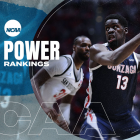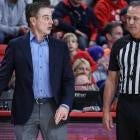Big East presidents formally approved to invite and accept the University of Connecticut as a member on a league-wide conference call Monday morning, sources told CBS Sports' Matt Norlander.
The conference call was the first of three major/official steps expected to happen this week that will attach UConn with the Big East brand again. UConn is on the verge of leaving the American Athletic Conference to return to the Big East ahead of the 2020-21 season, as previously reported by Norlander and Gary Parrish. The Hartford Courant and Digital Sports Desk first reported the move.
UConn's move would affect all of its athletic programs with the exception of football, which the Big East does not sponsor. A source told Parrish this expected move is largely designed to help return men's basketball to the more familiar brand of the Big East. However, the women's basketball program would also prefer to leave the AAC, and Hall of Fame coach Geno Auriemma has privately pushed for the move as well, the source added.
UConn's Board of Trustees plans to vote and approve the move on Wednesday, a source told Norlander.
"I'd be surprised if this ends pretty," a second source told Norlander, noting that the AAC is not going to make this transition easy on the program. "... [The Huskies] never fully embraced the American."
A formal announcement of the Big East approving the return of UConn to the conference is planned for Thursday in New York at Madison Square Garden, a third source told Norlander.
Norlander and Parrish both report that UConn is expected to be part of the Big East for the 2020-21 season as the league's 11th team with the Big East's men's basketball programs each playing 20 games to keep a true round-robin schedule. The Big East is expected to indefinitely settle on 11 schools in basketball -- and the AAC might as well, with UConn's imminent departure dropping the league's membership down from 12.
"It is our responsibility to always be mindful of what is in the best interest of our student-athletes, our fans and our future," UConn said Saturday in an unattributed statement. "With that being said, we have been and remain proud members of the American Athletic Conference."
Neither the AAC nor Big East would comment when asked by CBS Sports.
UConn had been a member of the Big East in basketball since the conference's inception in 1979. When the school decided to move its football program to the FBS level, it spent its first four seasons as an independent before joining the Big East in 2004. Both programs remained there until the original Big East dissolved as football-playing schools like Louisville, Pitt, Syracuse and Rutgers left to join Power Five conferences. Out of that fracture was born the AAC, which was where UConn moved in both football and basketball starting in 2013.
UConn's first season as a member of the AAC in basketball worked spectacularly as the Huskies won a national championship. They've only been selected for the NCAA Tournament once in the five seasons since, and fans have clamored for the program to return to the Big East. Their voices have only increased in volume in recent seasons.
As for the football program, life in the AAC has not been kind. In six seasons, the Huskies have only qualified for one bowl game. That 2015 season, in which the Huskies finished 6-7, is the only time the program has won more than three games in a season as a member of the AAC. The program's problems run deeper than conference affiliation, however, and some have wondered whether the school should consider giving up FBS football altogether.
If UConn is moving back to the Big East, it's unknown what will happen to the football program as the Big East does not sponsor football. CBS Sports reported the AAC does not want to keep UConn as a football-only member considering the school would have left it in every other sport.
Should UConn want to continue sponsoring an FBS program, it would likely have to do so as an independent -- at least temporarily -- as it did from 2000-03, though it's possible the MAC or Conference USA would be interested in adding the program.

















